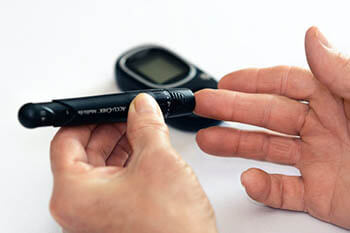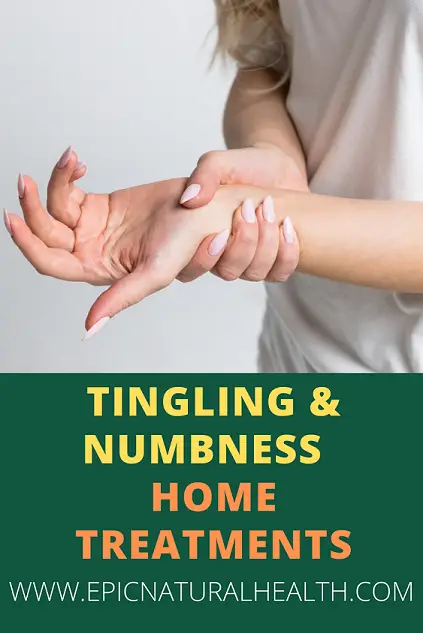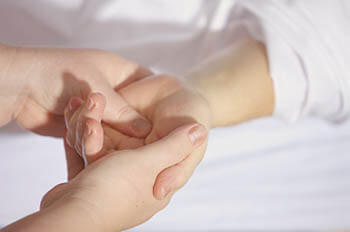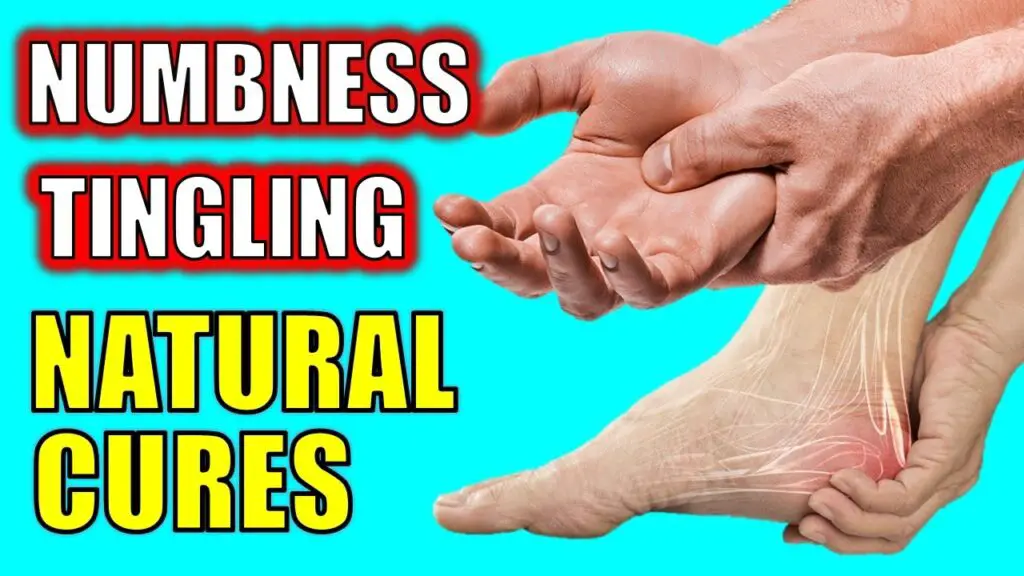A numb or tingling sensation in our hands and feet can be a worrying symptom. We may immediately think of the worst possible cause, and begin to panic.
However, numbness or tingling in our extremities is a more common complaint than you might think. Typically described as a kind of "pins and needles" sensation, this can often have a perfectly benign cause. It could be something as simple as stress or a vitamin deficiency. Prolonged sensations of numbness or pins and needles in the feet and hands can also be a sign of more serious illness. This is especially true if the sensations are accompanied by other symptoms.
Let's briefly take a look at some of the causes of numbness or pins and needles, as well as some natural treatments you can try to alleviate your symptoms at home.
Causes of Numbness and Tingling
Pins and needles or numbness in the feet and hands can have a variety of causes. If you aren't sure what's causing the sensation, you should always consult a doctor. Some of the common culprits are listed below.
1. Carpal Tunnel Syndrome

Carpal tunnel syndrome can be caused by arthritis, pregnancy, or, more commonly, repetitive work. Mainly targeting the hands, pain, numbness, and tingling may extend into the wrists and up the arms. Carpal tunnel syndrome can also cause a weak grip. If you ignore these symptoms and don't seek treatment, the muscles in your hands may begin to waste away.
Carpal tunnel is a very common cause of numbness or pins and needles in the hands.
2. Vitamin Deficiencies
Many vitamins are crucial for healthy nerves. For example, a lack of vitamin B12 can lead to pernicious anemia. In turn, anemia leads to peripheral neuropathy, which commonly presents itself as tingling and numbness symptoms in the hands and feet.
3. Infections and Toxins
Some chemicals, such as heavy metals or industrial and environmental chemicals, may cause symptoms of nerve damage. These symptoms include pins and needles in the hands and feet, numbness, and tingling. Certain medications, such as some chemotherapy treatments, may also have this effect.
Numbness and tingling in the hands and feet can also be a side effect of some infections, such as Lyme disease, shingles, or HIV and AIDS.
4. Alcohol Abuse

Alcoholism often goes hand in hand with vitamin deficiencies and low levels of important vitamins, such as thiamine. Alcohol abuse itself may also cause symptoms related to damage to the nerves. Overusing alcohol can have a variety of bad effects on a person's health, including the sensation of pins and needles in the hands and feet.
5. Autoimmune Diseases
Certain autoimmune diseases, such as lupus or rheumatoid arthritis, can cause nerve damage. This damage is what causes the unpleasant tingling symptoms or numbness in the extremities, often coupled with muscle wastage and a weak grip.
6. Trapped Nerves
A trapped nerve, whether due to damaged nerves, injury, localized illness, or any number of causes, can create unpleasant sensations in the hands and feet. It's important to realize that the sensations aren't limited to numbness or pins and needles. You may experience burning, tingling, pain, or a prickling sensation. Depending on the location of the trapped nerve and the cause, you might experience pain or odd symptoms in different areas of your body. For instance, a trapped nerve in your spinal cord may cause a strange sensation in the arms and upper body. However, that doesn't mean that a trapped nerve is necessarily located in your spinal cord. Trapped nerves can happen all over the body.
7. Diabetes

Diabetes is a very common cause of tingling and numbness in the extremities. In fact, it's estimated that diabetes is responsible for around 30% of all cases of peripheral neuropathy. Often, tingling in the feet and hands is one of the first symptoms of damage to the blood vessels caused by diabetes.
8. Injuries and Localized Trauma
An injury can cause nerves to be damaged, either by cutting or crushing. This causes pain, and the nerve damage can remain even after the wound appears to have healed. Damage to the nerves caused by trauma may heal in time, however, it's important to consult your doctor about your options if you think your symptoms are caused by an injury.
9. More Serious Illness - Multiple Sclerosis, Kidney Disease Etc
This is by no means an exhaustive list of the causes of peripheral neuropathy. For example, tingling in the hands and feet is one of the common symptoms of multiple sclerosis. Kidney disease, liver damage, chronic inflammation, blood flow issues, and hormone imbalances could also cause numbness in your extremities.

What Next?
The only way to properly establish what is causing your persistent pins and needles - and subsequently how to treat it - is to consult a doctor. The cause will affect how you treat your peripheral neuropathy. For example, you would treat diabetic neuropathy differently from nerve damage caused by an injury or repetitive strain disorder.
Seeking medical advice is the best way to learn how to treat your nerve damage. It can also help you to manage any existing condition you may have, and help prevent your peripheral neuropathy from getting any worse.
Natural Remedies
As mentioned earlier, tingling in the hands and feet is a common complaint, and can usually be managed successfully at home, depending on the cause.
1. Rest Your Hands and Feet

Excessive strain or repetitive movements of the hands and feet can cause numbness, tingling, or pins and needles. Propping up your feet, resting your hands, and regularly massaging the affected area can help. Rest allows your muscles time to relax and recover, and massages can get the blood flow moving again. Resting your hands is especially important if you suffer from carpal tunnel syndrome. Activities like typing at a computer keyboard can cause strain to the hands and wrists if you aren't positioned properly. Taking regular breaks is crucial to good health and wellness.
2. Destress
Severe stress and anxiety can cause physical issues. While we may know that anxiety can cause headaches, digestive issues, or sleepless nights, it can also create odd sensations in our extremities. These sensations might present themselves as tingling, numbness, prickling, and more. As peripheral neuropathy, these sensations could be caused by a stressful lifestyle.
3. Deal With Underlying Emotional Issues
Untreated mental or emotional issues, such as depression or anxiety, can also cause physical symptoms. Peripheral neuropathy is one of those issues. Taking regular breaks to care for your mental health - just as you'd care for your physical health - can leave you feeling happier and healthier. In some cases, treatment for depression may help to ease the symptoms of nerve damage.
4. Detox Your Body

If your nerve damage is caused by environmental toxins or infections, a medically approved detox could get your body back on track. A detox isn't a fad diet, it's a way of reviewing what you're eating and the damage it could be doing to your body. Cheap food and junk food often contain additives, preservatives, and other chemicals. Over time, this kind of food can do damage to your body.
5. Eat a Balanced Diet
If your peripheral neuropathy is caused by a vitamin deficiency, this needs to be dealt with as soon as possible. While vitamin supplements are a viable option, the best way to get all of your vitamins and nutrients is via your diet. A balanced diet is key for diabetics, and eating well can help to combat a variety of illnesses and health conditions. Obesity can be another trigger for peripheral neuropathy and other nerve disorders.
You may need to consider cutting down on the quantity of food you eat while upping the quality of what you do eat. Adjusting your diet is something you can do yourself at home, to whatever extent you're comfortable with. However, it's wise to consult with a doctor before making significant dietary changes. This is especially true if you're already suffering from diabetes or another serious health condition. Your doctor can give you valuable advice on how to rehaul your diet and lifestyle, helping you to create a viable action plan.
6. Reduce Alcohol Consumption
The excessive drinking of alcohol can cause damage to the nerves over time, or even increase the symptoms of peripheral neuropathy. This doesn't mean you can't drink alcohol. However, if you feel that your alcohol consumption is too high - or that you're becoming dependent on it, why not try to cut down?
Also, alcohol may contain high levels of sugar. Beer, for example, is generally very high in sugar. This can be a concern for diabetics or those with kidney issues, as alcohol can cause blood sugar to rise.
7. Quit Smoking

Smoking affects the whole body. One particular effect is that smoking restricts the blood supply. The blood flow to the peripheral nerves is then hindered, and the nerves suffer. A reduced blood flow leads to damaged nerves, which causes sensations in your hands and feet that may be bothering you.
8. Exercise Regularly

When you notice strange sensations in your hands and feet, the last thing you might want to do is exercise! However, when coupled with a healthy diet and balanced lifestyle, exercise can refresh and nourish your whole body. It promotes blood flow, releases "happy" hormones, and stretches out our muscles, helping us lose weight and burn fat. It's up to you what kind of exercise best for you. A brisk walk may work just as well as a run. Alternatively, exercises such as swimming don't put particular strain on one area of the body.
When to See a Doctor
It's always helpful to establish the root cause of any new or unusual sensations. Burning, tingling, numbness, or prickling in the hands and feet may be a common complaint, but it isn't exactly normal. Once you and your doctor have worked out what's causing damage to your nerves, you can work out a course of treatment.
If you think the sensations are spreading, getting worse, or are now accompanied by other symptoms, it would be wise to seek medical advice. If the sensations aren't responding to any of your natural treatments, why not see if your doctor has any advice?
Tingling and numbness in the hands and feet aren't pleasant, but there are plenty of treatments available.

